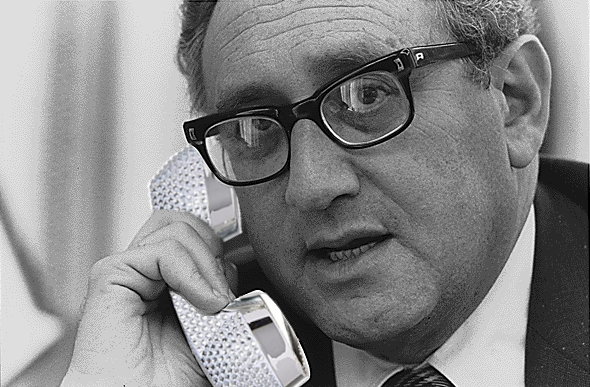Of Course Davos Wants To Hear from Henry Kissinger
What better forum could there be for one of the 20th century's ghouls to tell those who most benefit from the world as it is what they want to hear? PLUS: The U.S. arms market in Yemen will not be undersold!

Edited by Sam Thielman
IN 2015 I ATTENDED a Henry Kissinger speech. At the time, I was The Guardian's U.S. national security editor and I had been invited to a strategy forum at West Point, not to cover it but to listen to the various presentations. It was my first time visiting and the Hudson River Valley campus is as majestic as everyone says. On the final day of the conference, the decrepit Kissinger got to hold forth for what was probably an hour or so. That speech was off the record, and even if I was inclined to say that the statute of limitations on the forum’s ground rules has expired, my memory is such that I would not be able to faithfully recount what Kissinger said. Instead I remember three things about it.
First is that Kissinger was mid. Yale's Greg Grandin estimates that the man is materially responsible, in part or whole, for between three and four million people's deaths. The typical defense of him is that he's a towering genius, however much blood is on him. My recollection is that no such genius was on display. Anyone who pays attention to news consistently could have provided a similar tour d'horizon. Now, should I make it to my early nineties, I doubt I'll be able to summon any brilliance in a speech. But my decisions didn't kill millions of people, and no one would say about me, You don't understand, yes, the Cold War was brutal, but the guy is a titan of strategy on nuclear conflict and so forth.
Second is that he was warmly received by the "national security" notables assembled by the U.S. Army's premiere intellectual institution. (Sorry to the Combined Arms Center.) I remember feeling uneasy hearing the applause and seeing the smiling faces among senior and soon-to-be senior officers and distinguished Security State civilians for a man like this. I felt uneasier still that I was a face in that crowd.
Third is that I tried to redeem my presence at the speech by trying to get Kissinger to say explicitly who he was backing for president and accordingly make as much news as was possible to make at the time. I suppose I decided to disassociate in the manner journalism can provide. I was The Guardian's U.S. National Security Editor at that moment, rather than Spencer, The Person Invited Into The Same Room As Kissinger. Either way, the people who organized the conference admonished me, as was fair, since I was kind of breaking the rules of my attendance. Kissinger looked briefly uncomfortable, but I ultimately performed no journalistic feat at all.
I remembered all this upon learning that Kissinger will address the World Economic Forum on Tuesday. Harvard's Graham Allison will host a Conversation with Kissinger about "Historical Perspectives on War." Incredibly, the very next day, the Point-Zero-Zero One Percenter conference will take stock of the human-rights movement.
Last year, at an editor's request, I put together a lengthy obituary for Kissinger, and since Kissinger keeps on living, I'm constrained in how much I can cannibalize that piece for this edition. I truly hope you'll get to read it soon. But if you read Grandin's Kissinger's Shadow and especially Sy Hersh's The Price of Power, a clear theme is how consistently Kissinger tells the powerful exactly what they want to hear. Unsurprisingly, presidents and business titans counseled by Kissinger tend to learn from him that their inclinations are both just and historically informed. Kissinger, for decades, has simply been an elite feedback loop. Of course they want him at Davos. Again, not to cannibalize, but Augusto Pinochet's Chile was a laboratory for the neoliberalism offered now at Davos, and Kissinger was as enthusiastic an early backer of Pinochet as he would later be of Theranos. ("[Y]our greatest sin was that you overthrew a government which was going Communist," he once cabled Pinochet.)
Dealbook this morning reports that the view from Davos is one of "polycrisis," by which they mean the disarray of globalization. (That is, "the swirl of global emergencies that include economic slowdowns and rising inflation, the war in Ukraine and more.") The elite of the World Economic Forum consult one of the architects of today's world to guide them out of the polycrisis he played a role in creating. And he inevitably reinforces the convictions of this same class, who most benefit from the way the world currently is, that they and they alone hold the keys to responsibly guiding the world out of the polycrisis. And if they further extract wealth from the wreckage of a polycrisis-wracked world, who's to say there's anything wrong with that? Certainly no one at Davos.
Let's remember this classic Kissinger pronouncement from 2002:
The overthrow of the Iraq regime and, at a minimum, the eradication of its weapons of mass destruction would have potentially beneficent political consequences, as well: The so-called Arab street might conclude that the negative consequences of jihad outweigh any potential benefits. It could encourage a new approach in Syria, strengthen moderate forces in Saudi Arabia, multiply pressures for a democratic evolution in Iran, demonstrate to the Palestinian Authority that America is serious about overcoming corrupt tyrannies and bring about a better balance in oil policy within OPEC.
What a Historical Perspective on War! Kissinger further counseled against American mediation in what at the time was Israel's military attempt to crush the Second Palestinian Intifada. "More likely, the road to Jerusalem will lead through Baghdad," wrote a man who, let's reiterate, has been invited this week to tell the richest and most powerful people on the planet about historical perspectives on war.
The defining feature of that 2002 op-ed is its cynicism. Kissinger takes several paragraphs to arrive at a clear position on the coming war because he has to acknowledge how dramatically it undermines the sort of world order he's worked for. But he needs to endorse the Iraq war—which Republican contemporaries and proteges such as Jim Baker and Brent Scowcroft publicly warned was a disaster—in order to ensure his relevance to George W. Bush, then enjoying astronomical post-9/11 popularity. What were a few more million lives to play with, at this late hour in his life? Why not predict the war would yield everything not just Bush but the bipartisan foreign policy consensus claimed to want?
This sort of thing, I submit, is what Davos wants to hear from Henry Kissinger, whatever he actually says. Vindication in the guise of historical-lesson learning. Continuing along a status quo so clearly disastrous that even those in the room can feel it, all in the name of demonstrating confidence that the path that led here will also lead out.
Anyway, I clicked through the World Economic Forum forums page to see if bibliomancy could tell me anything about the Polycrisis. Sure enough, here's one called "Real Estate At A Turning Point":
Global real estate, with a value of more than $320 trillion, remains a core allocation for most investment portfolios, despite disruptions to the industry such as rising interest rates, changing lifestyle demand drivers, and new and innovative ownership structures like fractionalization.
How will these disruptions shape the future of the world's largest asset class?
So this is how neofeudalism looks from the vantage of the Swiss Alps. Now there's that skin-crawling feeling I remember from the 2015 Kissinger speech at West Point.
LAST WEEK IN THE GULF OF OMAN, the U.S.S. The Sullivans seized over 2,100 AK-47s apparently headed to Houthi militants in Yemen from Iran. Meanwhile, an Oxfam report from that same week found that between January 2021 and February 2022—President Biden's first year in office—at least 87 Yemeni civilians were killed by U.S. and U.K. weapons those governments provided to the Saudi-Emirati coalition. The Guardian:
The sheer number of attacks, the 87 civilians killed and 136 wounded amounted to, Butcher added, “a pattern of violence against civilians” which all parties to the conflict, including arms suppliers, had failed to prevent.
A further 13 airstrikes carried out by British or American-made jets had taken place on hospitals and clinics, the Oxfam research added, with farms and homes routinely hit. Civilians were forced to leave their homes or places of shelter after a total of 293 raids from the air.
The seizure on The Sullivans looks less like an enforcement of an arms embargo than ongoing support of one side of the conflict, and it just so happens to be the side that keeps buying American weapons and has overwhelming influence over global oil markets. Like Crazy Eddie said, the U.S. arms market will not be undersold.
ALSO LAST WEEK, I filed the magazine piece that I mentioned in the last two editions. This edition is a bit of a head-clear for me after living in the world of that piece for a while. (Though I've got to turn in my readback for the edit this week, so this is a temporary break.) My reward to myself for filing was to pick up Elif Shafak's 2006 novel The Bastard of Istanbul from my library holds. I had put it in my queue after reading Shafak's New York Times Book Review one-pager about Istanbul novels and seeing that she had been prosecuted for writing Bastard. I was solo parenting when I got the book, but couldn't stop myself from inhaling it in a little over a day.
It doesn't do The Bastard of Istanbul justice to call it a sublimely constructed story about the legacies of the Armenian Genocide. Shafak has really done history a service by confronting the hostilities of her native Turkiye to confronting its greatest crime, but that makes it sound like a polemic, and she's far too good of a novelist for that. The chapter she writes from the perspective of a family patriarch who is about to experience the genocide is titled "Pomegranate Seeds." Here's why:
Hovhannes Stamboulian remained quiet for a while, chewing the ends of his mustache. Then he muttered slowly but surely, "We need to work together, Jews, Christians and Muslims. Centuries and centuries under the same imperial roof. We have been living together all this time, albeit on unequal ground. Now we can make it fair and just for all, transform this empire together."
It was then that Kirkor Hagopian uttered those gloomy words, his face already closing up: "My friend, wake up, there is no together anymore. Once a pomegranate breaks and all its seeds scatter in different directions, you cannot put it back together."
The whole novel is written that powerfully and that beautifully. [I misted up reading this. My wife’s family is Armenian and pomegranates are hugely important to both Turks and Armenians. It’s such a perfect metaphor.—Sam.] Now I have to watch The Color of Pomegranates and wait for Shafak's The Forty Rules of Love to appear in my library queue. Rewards for getting the magazine readback done on time, maybe.

